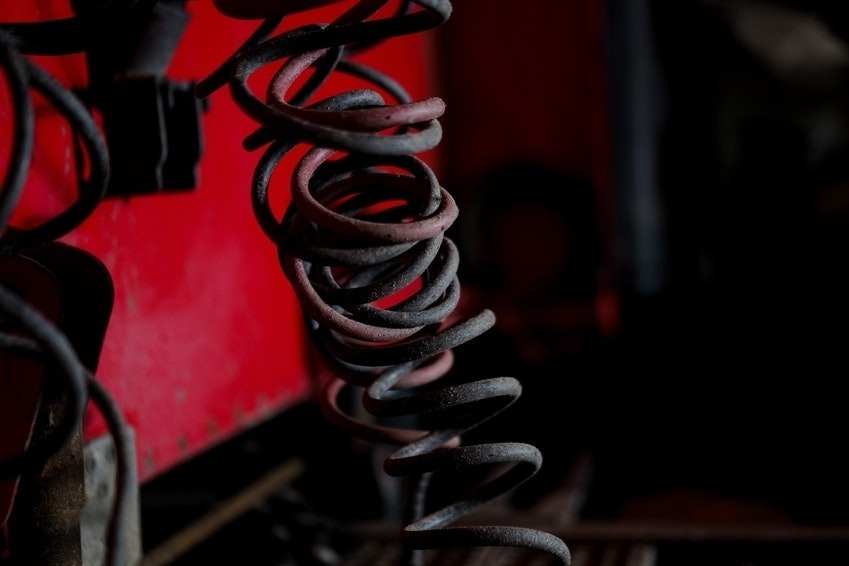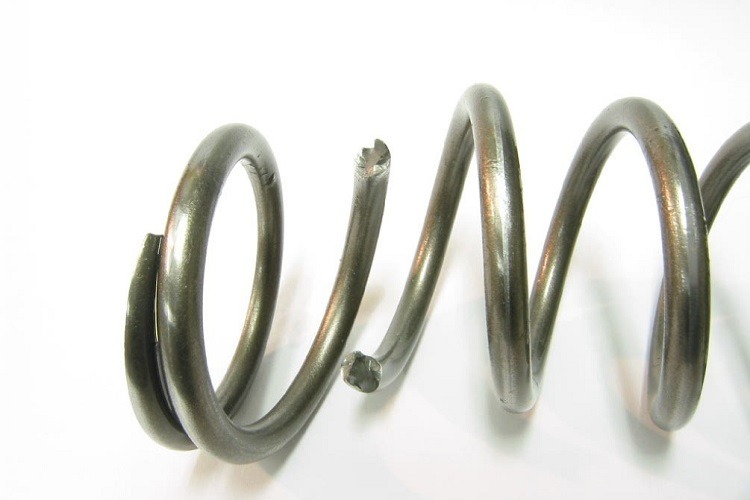Garage Door Spring Types and Signs They Need Replacement

If your garage door is working the way it was designed and was installed properly, opening, and closing it should be easy-peasy. You push a button on a remote, wall panel, or within a smartphone app and voila – it goes up or down automatically, with little effort and not much sound. As such, your garage door is one of those things that you never really think about too much until it breaks. And then you really appreciate the job that it does. But what if everything doesn’t go as planned? There could be an electrical issue, the door could be off the tracks or, even worse, the springs may be faulty – necessitating a call to your Loveland garage door repair specialists to determine the problem and possible solution.
There are many possible reasons for malfunctioning garage doors, but we’re going to focus on one of the top causes of garage door repair issues today – broken garage door springs.
Why Garage Door Springs are Extremely Important
In some ways, operating a garage door is a modern convenience we’ve all been conditioned to believe will never fail. But sometimes things go wrong, often due to broken garage door springs. Like most homeowners, you’ve probably given little notice to your garage door springs. Unless you make a conscious effort to notice them, they can be overlooked when you enter or leave your garage. It’s an oversight that’s easy to make, but one that happens more often than it should. Like virtually all mechanical components, garage door springs eventually wear out and will need to be replaced. With proper care, they could last as long as your garage door itself, about ten years or longer with regular use.
The Types of Garage Door Springs
There are many kinds of springs for a Loveland-area garage door, but they’re mostly put into one of two categories: Torsion springs, or extension springs. We’ll talk a little about each one.
Torsion Springs
The typical garage door has anywhere from one to four torsion springs on each. The number depends on factors including the size, strength, and weight of the door. They’re installed on the metal shaft straight above the door opening. Because of the tension in garage door springs and the complexity of replacing them, we always recommend having this sort of work done by a qualified garage door repair professional.
With the springs installed, aluminum drums are then situated on either end of the accompanying metal shaft. How did this kind of garage door spring get its name? Because after necessary cable length and the drums are set, the springs are wound and locked in relation to the assembly, thereby creating tension which gives them their power.
If you have broken garage door springs, they may be replaced with newer standard torsion springs, early set torsion springs, steel rolling door tension springs, or torque master torsion springs.
Extension Springs
Extension springs got their name due to the fact they store energy by stretching or extending. As your garage door is closed, progressively more weight is taken off the horizontal track, adding tautness to the stretched extension springs. Normally, there are two extension springs in each door, each one positioned on either side, and running parallel to the horizontal track.
Each spring autonomously delivers tension independent of the other, on the opposite sides of the door. Some extension doors feature the mechanical benefit of metal pulleys. But in some instances, uneven dispersal of force can make the door walk up and down the opening. This may occur when either side of the garage door appears to lag behind the other while the door is operated. A Loveland garage door repair specialist can solve this problem through some modifications to balance the spring tension.
Extension springs, of course, can further be sub-classified based on the type of ends they have. These springs may feature double looped, open looped or clipped ends. How does it all come together? The force employed by every torsion spring attached to the garage door is equally dispersed across the shaft, before getting transferred to both drums. As such, the cables rotate at an equal rate, thereby, eliminating “walking” when the door gets opened.
It’s important to point out while shopping for garage door springs, one isn't necessarily better than the other. Extension springs are normally less expensive and most often targeted toward residential use, but they have a shorter lifespan. Torsion springs are known for having fewer mechanical components, last longer, and are more expensive but also can be used in a residential setting.
Why Garage Door Springs Matter
In the long run, your garage door won’t operate properly without functional torsion or extension springs. Whichever one you choose, they’re both important for a number of reasons:
- They make it easy to open or close a garage door, which could be anywhere from 80 to 400 pounds or more depending on size, insulation, and build materials. Please don’t try and repair or replace garage door springs on your own. They can cause serious damage to personal property, severe bodily injury, or worse.
- If the garage door opener fails, you’ll still likely be able to open the door assuming the springs are working properly.
- Functional garage door springs allow you to open or close the garage door from the comfort of your vehicle or from inside the garage – without having to worry about inclement weather or other inconveniences.
- If the garage door springs work and your garage door operates as intended without getting stuck or thrown off track, your home’s curb appeal is enhanced, potentially boosting not only curb appeal but the value of your home.

Our garage door repair team is frequently called out in Loveland to fix this issue, and we’re going to run through a few different indicators that might confirm that this is indeed the problem that you’re facing.
These Signs Might Indicate Broken Garage Door Springs
Before you start freaking out, it’s actually quite normal that your garage door springs will fail eventually. All of the moving parts on your garage door will. Here’s a few things that might indicate that that is what has happened.
Loud Snapping Noise
We’ll start here as it’s probably the most obvious sign of a garage door spring breaking. These springs are under tremendous strain, so when they break, you better believe that you will know about it. The sound this makes can be pretty loud.
So if you hear a loud noise and then your door won’t open afterward, you can be quite confident that broken garage door springs are to blame. Springs don’t just break when the door is in motion either; you might hear this noise when you’re stood outside your home or even from the interior of your property if you have an attached garage.
Garage Door Opener Won’t Fully Open the Door
Your garage door springs support the vast amount of the weight of the door when it is in motion. There’s no way your opener would have enough clout to manage even a significant portion of that weight on its own. If this was even attempted, it’d likely do some pretty serious damage to the opener. And it’s for that reason that most modern openers come fitted with a feature known as “opener force”.
If your opener has detected that there is more strain being put on it than usual, this feature is activated and the opener won’t open the door. This is to not only protect the opener from damage, but also to protect anyone in the vicinity, as broken garage door springs can result in the door falling fast and unexpectedly. This brings us to our next point.
Your Overhead Door “Falls” Down...Fast
Remember we just talked about a safety feature known as "opener force". Well, not all garage door openers come equipped with that. In fact, most older openers don't. If your garage door springs break and you have an older opener, it will struggle to try and take the weight on its own. What will usually happen is that it gets so far, and then can’t manage any longer, and the door will come crashing down. This is a sure sign that you’re dealing with broken garage door springs.
Your Garage Opens Crookedly
Garage door springs are not all the same. There are different types. Torsion springs for a garage door run sideways above the center of the door. Lots of newer garage doors are fitted with torsion springs. Extension springs are the other main type of spring. They run parallel to the tracks, located on either side of the door.
If you have extension springs, what can sometimes happen is that the spring can break on one side. You'd be very unlucky to have both of your garage door springs break at the same time. Because the other spring is still supporting a lot of the weight, your overhead door opener might still be able to open the door, but it'll be lopsided or crooked. It'll be higher on the side that still has a functional spring.
Damn, That Garage Door is Heavy
If the door is not opening with the opener, it’s wise to try and open it manually. It could just be a problem with the opener…So disconnect the opener system. Then attempt to open the door manually. A garage door with its springs intact should open smoothly. After all, the springs are taking most of the weight for you. But if you attempt to do so and the door feels impossibly heavy, you can be fairly confident that at least one of the springs is broken. You’ll need to call a garage door repair expert to replace it.
Why Garage Door Springs Should Never Be Replaced By the Homeowner
We live in a time where there’s more information available to help people with DIY projects than ever before. Things like YouTube can be brilliant, but they can also sometimes be dangerous. Messing around with a garage door is no joke if you’re not sure what you’re doing. They can weigh hundreds of pounds. If that falls on you, not to be morbid, but you might not get up again. It’s simply not worth the risk to save a few bucks. Your life is worth more than that.
Call Our Loveland Garage Door Repair Experts
Our Loveland garage door repair team has almost a decade of experience in diagnosing and repairing all sorts of garage door issues, including the installation of new garage door springs. We're proud to provide exceptional customer service and premium products at affordable prices. Call us at 970-663-7335 with any questions or contact us online to request a no-cost inspection of your broken garage door springs.
